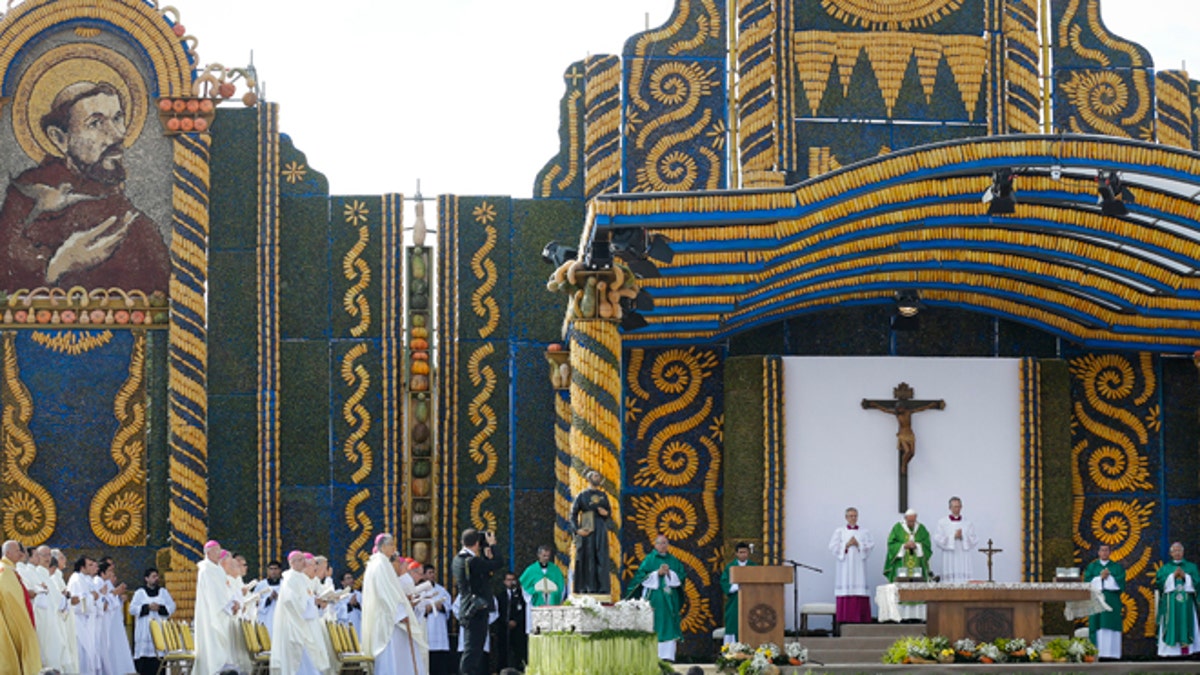
July 12, 2015: Pope Francis celebrates mass in Asuncion, Paraguay. (AP Photo/Victor R. Caivano)
ASUNCION, Paraguay – Pope Francis put into practice his call for the world's poor and powerless to not be left on the margins of society by visiting a flood-prone slum Sunday and insisting that the Catholic Church be a place of welcome for all — sick and sinners especially.
On the final day of his three-nation South American tour, Francis sought to offer a message of hope and mission to the residents of the Banado Norte shantytown and to an estimated 1 million people gathered for his farewell Mass on the same swampy field where St. John Paul II proclaimed Paraguay's first saint nearly 30 years ago.
"How much pain can be soothed, how much despair can be allayed in a place where we feel at home!" Francis said in outlining his vision of the church. "Welcoming the hungry, the thirsty, the stranger, the naked, the sick, the prisoner, the leper and the paralytic."
The stage for the Mass was a remarkable sight: A huge triptych with the pope's Jesuit IHS insignia over the central altar, flanked by images of his namesake, St. Francis of Assisi, on one side and the founder of his Jesuit religious order, St. Ignatius Loyola, on the other. The entire structure, an ode to the important role Jesuit missionaries played in Paraguay, was a mosaic made out of 40,000 ears of corn, 200,000 coconuts, 1,000 squash gourds and many, many dried beans.
Artist Koki Ruiz told The Associated Press earlier in the week that the scene was an "homage to the ancient Guarani aborigines who respected Mother Earth."
Francis has emphasized care for creation and its most oppressed people during his tour of Ecuador, Bolivia and Paraguay. He drew cheers when he arrived in Banado Norte on the banks of the River Paraguay on Sunday saying he couldn't have left Paraguay without visiting, "without being on YOUR land."
Many residents of Banado Norte are squatters on municipal land who have come from rural areas in the northeastern part of the country where farmland has been increasingly bought up by Brazilians and multi-national companies. Residents argue they should be given title to the land because they have worked to make it habitable with little help from the city.
"We built our neighborhoods piece by piece, we made them livable despite the difficulties of the terrain, the rising of the river and despite public authorities who either ignored us or were hostile to us," resident Maria Garcia told the pope.
Francis said he wanted to visit the neighborhood of shacks of plywood and corrugated metal to encourage the residents' faith despite the difficulties they encounter. In addition to the lack of services, heavy rains regularly burst the Paraguay River banks and turn Banado Norte's dirt roads into impassable pools of mud.
Francis said he wanted "to see your faces, your children, your elderly, and to hear about your experiences and everything you went through to be here, to have a dignified life and a roof over your heads, to endure the bad weather and the flooding of these last few weeks."
Some of the estimated 100,000 residents shrieked as Francis walked by, reaching out to touch his white cassock and snap a photo with their cellphones.
"Now I can die peacefully," said Francisca de Chamorra, an 82-year-old widow who moved to the shanty in 1952. "It's a miracle that a pope has come to this muddy place."
Francis has spent much of the past week — and before that much of his pontificate — railing about the injustices of the global capitalist system that he says idolizes money over people, demanding instead a new economic model where the Earth's resources are distributed equally among all.
"Putting bread on the table, putting a roof over the heads of one's children, giving them health and an education - these are essential for human dignity, and business men and women, politicians, economists, must feel challenged in this regard," Francis told a gathering of business leaders, politicians, labor union leaders and other civil society groups on Saturday evening. "I ask them not to yield to an economic model which is idolatrous, which needs to sacrifice human lives on the altar of money and profit."
After meeting with Argentine President Cristina Fernandez, who traveled to neighboring Paraguay for Francis' final Mass along with thousands of their Argentine countrymen, Francis meets with young people and then flies to Rome Sunday night.
